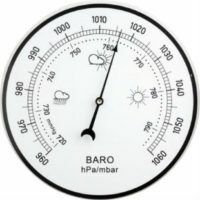
Atmospheric air has a physical density, due to which it is attracted to the Earth and creates pressure. During the development of the planet, both the composition of the atmosphere and its atmospheric pressure changed. Living organisms were forced to adapt to the existing air pressure, changing their physiological characteristics. Deviations from the average atmospheric pressure cause changes in the state of health of a person, while the degree of sensitivity of people to such changes is different.
- Normal atmospheric pressure
- Effects on human health
Normal atmospheric pressure
The air extends from the Earth's surface to heights of the order of hundreds of kilometers, beyond which the interplanetary space begins, and the closer to the Earth, the more compressed the air under its own weight, respectively, atmospheric pressure is highest at the earth's surface, decreasing with increasing altitude.
Atmospheric pressure is measured by a barometer graduated in millimeters of mercury( mmHg), or in other physical units, for example in pascals( Pa).760 millimeters of mercury correspond to 101 325 pascal, but in everyday life the measurement of atmospheric pressure in pascals or derived units( hectopascals) did not stick.
Previously, atmospheric pressure was also measured in millibars that were disused and replaced by hectopascals. The norm of atmospheric pressure is 760 mm Hg. Art.corresponds to the norm of atmospheric pressure in 1013 mbar.
Pressure 760 mm Hg. Art.corresponds to the action for each square centimeter of the human body strength of 1,033 kilograms. Totally, the entire surface of the human body is pressurized by air with a force of the order of 15-20 tons.
But a person does not feel this pressure, because it is balanced by air gases dissolved in tissue fluids. This equilibrium is disturbed by changes in atmospheric pressure, which the person perceives as a deterioration of well-being.
For individual locations, the average value of atmospheric pressure differs from 760 mm.gt;Art. So, if in Moscow the average pressure is 760 mm Hg. In St. Petersburg, only 748 mm Hg. Art.
At night, atmospheric pressure is slightly higher than daytime, and at atmospheric poles the variations in atmospheric pressure are more pronounced than inequatorial zone, which only confirms the regularity that the polar regions( the Arctic and the Antarctic) as an inhabitant are hostile to man.
In physics, the so-called barometric formula is derived, according to which, with an increase in altitude for each kilometer, atmospheric pressure drops by 13%.The actual distribution of air pressure follows the barometric formula is not entirely accurate, because depending on the altitude, the temperature, composition of the atmosphere, the concentration of water vapor and other parameters change.
Depends atmospheric pressure and weather, when air masses move from one location to another. All the living things on Earth also respond to atmospheric pressure. So, fishermen know that the norm of atmospheric pressure for fishing is low, because with decreasing pressure predatory fish prefer to go hunting.
to contents ^Influence on human health
Meteodependent people, and there are 4 billion on the planet, are sensitive to changes in atmospheric pressure, and some of them can accurately predict weather changes based on their own well-being.
To answer the question, what is the norm of atmospheric pressure is most optimal for places of stay and human life, it is rather difficult, because people adapt to life in different climatic conditions. Typically, the pressure ranges from 750 to 765 mm Hg. Art.does not worsen the person's health, these values of atmospheric pressure can be considered normal.
With variations in atmospheric pressure, weather-dependent people can sense:
- headache;
- spasms of blood vessels with circulatory disorders;
- weakness and drowsiness with increased fatigue;
- joint pain;
- dizziness;
- feeling of numbness in the limbs;
- decreased heart rate;
- nausea and intestinal disorders;
- shortness of breath;
- decreased visual acuity.
The baroreceptors located in the body cavities, joints and blood vessels respond first to pressure changes.
Also changes in pressure can lead to mental disorders - people experience anxiety, irritation, restless sleep or, in general, can not fall asleep.
The statistics confirm that when abrupt changes in atmospheric pressure increase the number of offenses, accidents in transport and production. The influence of atmospheric pressure on the arterial pressure is traced. In hypertensive patients, increased atmospheric pressure can cause a hypertensive crisis with headache and nausea, despite the fact that at this time a clear sunny weather is established.
On the lowering of atmospheric pressure, on the contrary, hypotonics react more sharply. Reduced concentration of oxygen in the atmosphere causes them a violation of blood circulation, migraine, shortness of breath, tachycardia and weakness.
Meteosensitivity can result from unhealthy lifestyles. The following factors may lead to meteorological sensitivity or aggravate the degree of its manifestation:
- low physical activity;
- improper diet with associated excess weight;
- stress and constant nervous tension;
- poor state of the environment.
Elimination of these factors reduces the degree of meteosensitivity. Meteodependent people should:
- include in the diet products with a high content of vitamin B6, magnesium and potassium( vegetables and fruits, honey, lactic acid products);
- to limit the consumption of meat, salted and fried foods, sweets and spices;
- to stop smoking and drinking alcohol;
- to increase physical activity, perform pedestrian walks in the fresh air;
- order sleep, sleep at least 7-8 hours.
On the recommendation of a doctor, meteorological dependent people can be assigned natural adaptogenes - tinctures of ginseng, eleutherococcus, preparations based on reindeer antlers.
